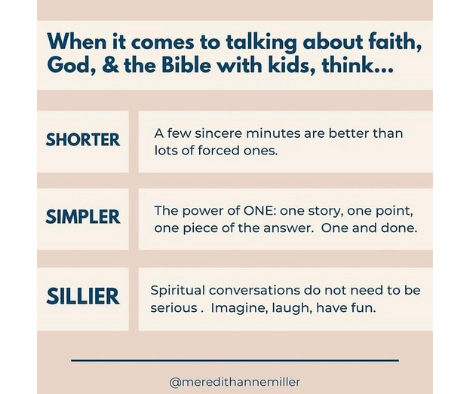Yes, we’ll be giving recommendations for guiding principles, activities, and helpful phrases. But hear this: you are not ultimately in charge of your children’s faith:
“As hard as we might work to give kids our faith, we can’t. Faith is a gift from from God…. Our job as parents (and as those who support parents) is to help the kids in our care be ready to feel the wind of the Holy Spirit in their lives whenever and wherever it blows” (Laura and Robert Keeley, Dear Parent: A Guide for Family Faith Formation).
To some, this might be more nervewracking, but I find it comforting: it’s not all up to me and my skills or lack of skills in talking about Jesus. I have to/get to trust God to play God’s part.
It also makes faith formation the task of the lifetime of your grandparent/parent/child relationship, not just of their toddler years.
Faith is the task of a lifetime
Hopefully you are still learning and growing in your faith, in your understanding of God, so you shouldn’t try to cram everything in at once for your children–you have their and your lifetimes.
And life will deliver you opportunities to encourage your children to develop:
- a sense of awe and wonder
- an awareness of God as both outside of them and within them
- ways of relating to and experiencing this God
- a sense of community, of relating to other people, including taking social action
- a search for meaning while engaging with difficult issues: death, freedom, aloneness, suffering
The Keeley’s talk about the importance of just being together, of “dwelling richly,” and not just adding more things to do. Of the power of letting your children see you at your own faith practices–devotions, worship, service.
The building blocks of faith
There are some basic things we want our children to know and understand:
- I belong to Jesus and to his body, the church.
- I know and understand the story of God’s faithfulness–and that I’m a part of it.
- I have hope that, through Jesus, and through all God’s promises, God is making all things new–and God is using me to make that happen.
- I am called to work in God’s kingdom and I am equipped to do that work.
We don’t have to think of these as items to tick off. They can be themes interwoven throughout your day and your week, and as language to use as you look at and talk about what is shaping your family’s faith as you go about your lives.
You don’t need all the answers
Children at every age don’t need you to have all the answers about God and the Bible–they need to see that your faith is meaningful to your life. If they ask something that you don’t have an immediate answer to, exploring it together gives them the sense that faith is something that can continue to grow, that it is a relationship and not just a list of things they can know. These are helpful phrases (thanks to Meredith Ann Miller and Brad Griffin of the Fuller Youth Institute):
I don’t know, but… let’s find out together, let’s ask so-and-so, what do you guess, this is what I guess, this is what I’ve experienced, this is how I understand it but it’s also a bit of a mystery, etc.
Lots of people who love Jesus think differently about that… this is what I think, I used to think X but I learned Y and now I think Z, etc.
That’s a really important idea. Let’s take some time with that. This is useful for complex ideas and big questions: tackle them a little bit at a time.
There’s more to it, but I’d be talking too long. We’ll get to that later. You can use this when you have to break down a complex idea–but then be sure to circle back to it!

Other avenues
- Tell your own faith stories, too.
- Take them with you when you serve.
- Let them see you have your own devotions.
- Ask them random questions about their ideas and experiences of church, of Bible stories, of God and Jesus (especially when driving or going for a walk, so there isn’t the face-to-face pressure that can stymy many children).
- Don’t be afraid to tell them that people disagree with how to understand big issues of faith, or that something is a mystery, or that something is your guess.
- Gather a bunch of Bibles with different translations and compare how they present a story or a verse (we’ve had great fun doing that in Sunday school).
Children with intellectual disabilities
Children and teens with intellectual disabilities will have varying understandings of faith and of what communion is all about. Happily, faith is more about having a relationship with Jesus, about trusting God, than it is about understanding sophisticated theology. There are so many deep truths that those with intellectual disabilities can fully live out: God loves you, Jesus chooses you, God forgives you when you are sorry for things you do, God wants you to talk to him about what is going on in your life, Jesus wants to help you, God created this amazing world, etc.
